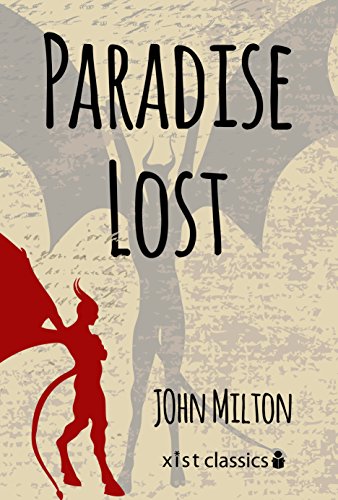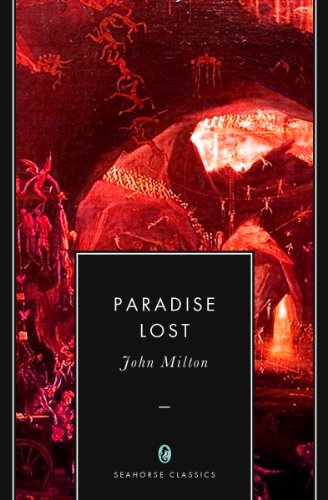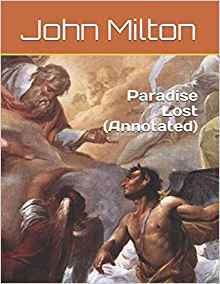-
Paradise Lost
John Milton
eBook (Xist Classics, June 8, 2015)An Epic Poem on an Even Grander Scale “Better to reign in Hell, than to serve in Heaven.” ― John Milton, Paradise Lost In John Milton's Paradise Lost, the author tells the story of the fall of man, developing characters from the familiar Biblical narrative. This Xist Classics edition has been professionally formatted for e-readers with a linked table of contents. This ebook also contains a bonus book club leadership guide and discussion questions. We hope you’ll share this book with your friends, neighbors and colleagues and can’t wait to hear what you have to say about it.Xist Publishing is a digital-first publisher. Xist Publishing creates books for the touchscreen generation and is dedicated to helping everyone develop a lifetime love of reading, no matter what form it takes Get your next Xist Classic title for Kindle here: http://amzn.to/1A7cKKl Find all our our books for Kindle here: http://amzn.to/1PooxLl Sign up for the Xist Publishing Newsletter here. Find more great titles on our website.
-
Paradise Lost
John Milton
eBook (, Aug. 16, 2017)Of Man’s first disobedience, and the fruit Of that forbidden tree whose mortal taste Brought death into the World, and all our woe, With loss of Eden, till one greater Man Restore us, and regain the blissful seat, Sing, Heavenly Muse, that, on the secret top Of Oreb, or of Sinai, didst inspire That shepherd who first taught the chosen seed In the beginning how the heavens and earth Rose out of Chaos: or, if Sion hill Delight thee more, and Siloa’s brook that flowed Fast by the oracle of God, I thence Invoke thy aid to my adventurous song, That with no middle flight intends to soar Above th’ Aonian mount, while it pursues Things unattempted yet in prose or rhyme.
-
Paradise Lost
John Milton
eBook (Seahorse Publishing, July 8, 2013)This Edition Features● A Detailed Biography of John Milton● A Fully Interactive Table of Contents● Superior Kindle FormattingIn Paradise Lost Milton produced poem of epic scale, conjuring up a vast, awe-inspiring cosmos and ranging across huge tracts of space and time. And yet, in putting a charismatic Satan and naked Adam and Eve at the centre of this story, he also created an intensely human tragedy on the Fall of Man. Written when Milton was in his fifties—blind, bitterly disappointed by the Restoration and briefly in danger of execution—Paradise Lost's apparent ambivalence towards authority has led to intense debate about whether it manages to 'justify the ways of God to men', or exposes the cruelty of Christianity.Seahorse Classics brings great works of literature to life in digital format, upholding the highest standards in e-book production and celebrating reading in all its forms. Look for more titles in the Seahorse Classics collection to build your digital library.
-
Paradise Lost
John Milton
eBook (, Aug. 25, 2020)Paradise Lost is an epic poem in blank verse by the 17th-century English poet John Milton (1608–1674). The first version, published in 1667, consisted of ten books with over ten thousand lines of verse. A second edition followed in 1674, arranged into twelve books (in the manner of Virgil's Aeneid) with minor revisions throughout and a note on the versification. It is considered by critics to be Milton's major work, and it helped solidify his reputation as one of the greatest English poets of his time.The poem concerns the biblical story of the Fall of Man: the temptation of Adam and Eve by the fallen angel Satan and their expulsion from the Garden of Eden. Milton's purpose, stated in Book I, is to "justify the ways of God to men"John Milton (9 December 1608 – 8 November 1674) was an English poet, polemicist, man of letters, and civil servant for the Commonwealth of England under its Council of State and later under Oliver Cromwell. He wrote at a time of religious flux and political upheaval, and is best known for his epic poem Paradise Lost (1667), written in blank verse.Milton's poetry and prose reflect deep personal convictions, a passion for freedom and self-determination, and the urgent issues and political turbulence of his day. Writing in English, Latin, Greek, and Italian, he achieved international renown within his lifetime, and his celebrated Areopagitica (1644), written in condemnation of pre-publication censorship, is among history's most influential and impassioned defences of free speech and freedom of the press. His desire for freedom extended into his style: he introduced new words (coined from Latin) to the English language, and was the first to employ non-rhymed verse outside of the theatre.William Hayley's 1796 biography called him the "greatest English author", and he remains generally regarded "as one of the preeminent writers in the English language", though critical reception has oscillated in the centuries since his death (often on account of his republicanism). Samuel Johnson praised Paradise Lost as "a poem which...with respect to design may claim the first place, and with respect to performance, the second, among the productions of the human mind", though he (a Tory and recipient of royal patronage) described Milton's politics as those of an "acrimonious and surly republican". Poets such as William Blake, William Wordsworth and Thomas Hardy revered him.
-
Paradise Lost
John Milton
Paperback (Independently published, Dec. 3, 2017)This is an annotated version of the book 1. contains an updated biography of the author at the end of the book for a better understanding of the text. 2. This book has been checked and corrected for spelling errors Of Mans First Disobedience, and the Fruit Of that Forbidden Tree, whose mortal tast Brought Death into the World, and all our woe, With loss of EDEN, till one greater Man Restore us, and regain the blissful Seat, Sing Heav'nly Muse, that on the secret top Of OREB, or of SINAI, didst inspire That Shepherd, who first taught the chosen Seed, In the Beginning how the Heav'ns and Earth Rose out of CHAOS: Or if SION Hill Delight thee more, and SILOA'S Brook that flow'd Fast by the Oracle of God; I thence Invoke thy aid to my adventrous Song, That with no middle flight intends to soar Above th' AONIAN Mount, while it pursues Things unattempted yet in Prose or Rhime. And chiefly Thou O Spirit, that dost prefer Before all Temples th' upright heart and pure, Instruct me, for Thou know'st; Thou from the first Wast present, and with mighty wings outspread Dove-like satst brooding on the vast Abyss And mad'st it pregnant: What in me is dark Illumine, what is low raise and support; That to the highth of this great Argument I may assert th' Eternal Providence, And justifie the wayes of God to men. Say first, for Heav'n hides nothing from thy view Nor the deep Tract of Hell, say first what cause Mov'd our Grand Parents in that happy State, Favour'd of Heav'n so highly, to fall off From their Creator, and transgress his Will For one restraint, Lords of the World besides? Who first seduc'd them to that fowl revolt? Th' infernal Serpent; he it was, whose guile Stird up with Envy and Revenge, deceiv'd The Mother of Mankinde, what time his Pride Had cast him out from Heav'n, with all his Host Of Rebel Angels, by whose aid aspiring To set himself in Glory above his Peers, He trusted to have equal'd the most High, If he oppos'd; and with ambitious aim Against the Throne and Monarchy of God Rais'd impious War in Heav'n and Battel proud With vain attempt. Him the Almighty Power Hurld headlong flaming from th' Ethereal Skie With hideous ruine and combustion down To bottomless perdition, there to dwell In Adamantine Chains and penal Fire, Who durst defie th' Omnipotent to Arms. Nine times the Space that measures Day and Night To mortal men, he with his horrid crew Lay vanquisht, rowling in the fiery Gulfe Confounded though immortal: But his doom Reserv'd him to more wrath; for now the thought Both of lost happiness and lasting pain Torments him; round he throws his baleful eyes That witness'd huge affliction and dismay Mixt with obdurate pride and stedfast hate: At once as far as Angels kenn he views The dismal Situation waste and wilde, A Dungeon horrible, on all sides round As one great Furnace flam'd, yet from those flames No light, but rather darkness visible Serv'd only to discover sights of woe, Regions of sorrow, doleful shades, where peace And rest can never dwell, hope never comes That comes to all; but torture without end Still urges, and a fiery Deluge, fed With ever-burning Sulphur unconsum'd: Such place Eternal Justice had prepar'd For those rebellious, here their Prison ordain'd In utter darkness, and their portion set As far remov'd from God and light of Heav'n As from the Center thrice to th' utmost Pole. O how unlike the place from whence they fell! There the companions of his fall, o'rewhelm'd With Floods and Whirlwinds of tempestuous fire, He soon discerns, and weltring by his side One next himself in power, and next in crime, Long after known in PALESTINE, and nam'd BEELZEBUB.
-
Paradise Lost Annotated
John Milton
eBook (, Sept. 7, 2020)Paradise Lost is an epic poem in blank verse by the 17th-century English poet John Milton. It was originally published in 1667 in ten books; a second edition followed in 1674, redivided into twelve books (in the manner of the division of Virgil's Aeneid) with minor revisions throughout and a note on the versification. The poem concerns the Judeo-Christian story of the Fall of Man; the temptation of Adam and Eve by the fallen angel Satan and their expulsion from the Garden of Eden. Milton's purpose, stated in Book I, is "justify the ways of God to men" and elucidate the conflict between God's eternal foresight and free will.It is considered by critics to be Milton's 'major work', and helped solidify his reputation as one of the greatest English poets of his time. he poem concerns the Biblical story of the Fall of Man: the temptation of Adam and Eve by the fallen angel Satan and their expulsion from the Garden of Eden. Milton's purpose, stated in Book I, is to 'justify the ways of God to men'.
-
Paradise Lost
John Milton
eBook (, April 29, 2020)John Milton's Paradise Lost is one of the greatest epic poems in the English language. It tells the story of the Fall of Man, a tale of immense drama and excitement, of rebellion and treachery, of innocence pitted against corruption, in which God and Satan fight a bitter battle for control of mankind's destiny. The struggle rages across three worlds - heaven, hell, and earth - as Satan and his band of rebel angels plot their revenge against God. At the center of the conflict are Adam and Eve, who are motivated by all too human temptations but whose ultimate downfall is unyielding love.Marked by Milton's characteristic erudition, Paradise Lost is a work epic both in scale and, notoriously, in ambition. For nearly 350 years, it has held generation upon generation of audiences in rapt attention, and its profound influence can be seen in almost every corner of Western culture.
-
Paradise Lost - Classic Illustrated Edition
John Milton, L. Carr
eBook (Heritage Illustrated Publishing, Jan. 12, 2016)* Beautifully illustrated with William Blake's delightful illustrations from early editions, Paradise Lost is John Milton's epic poem intended to 'justify the ways of God to men', a mission that required a complex drama whose source is both historical and deeply personal.* Just as accessible and enjoyable for today's readers as it would have been when first published, the novel is one of the great works of English literature and continues to be widely read throughout the world.* This meticulous digital edition from Heritage Illustrated Publishing is a faithful reproduction of the original text and is enhanced with images carefully selected by our team of professional editors.
-
Paradise Lost
John Milton, Bruce Hamilton
Paperback (CreateSpace Independent Publishing Platform, Feb. 25, 2018)Paradise Lost is an epic poem in blank verse by the 17th-century English poet John Milton (1608–1674). The first version, published in 1667, consisted of ten books with over ten thousand lines of verse. A second edition followed in 1674, arranged into twelve books (in the manner of Virgil's Aeneid) with minor revisions throughout and a note on the versification. It is considered by critics to be Milton's major work, and it helped solidify his reputation as one of the greatest English poets of his time. The poem concerns the biblical story of the Fall of Man: the temptation of Adam and Eve by the fallen angel Satan and their expulsion from the Garden of Eden. Milton's purpose, stated in Book I, is to "justify the ways of God to men".
-
Paradise Lost
John Milton
Hardcover (Dead Authors Society, July 12, 2016)None
-
Paradise Lost
John Milton, George Wilson
eBook (, Dec. 30, 2019)Paradise Lost is an epic poem in blank verse by the 17th-century English poet John Milton. It was originally published in 1667 in ten books; a second edition followed in 1674, redivided into twelve books (in the manner of the division of Virgil's Aeneid) with minor revisions throughout and a note on the versification. The poem concerns the Judeo-Christian story of the Fall of Man; the temptation of Adam and Eve by the fallen angel Satan and their expulsion from the Garden of Eden. Milton's purpose, stated in Book I, is "justify the ways of God to men" and elucidate the conflict between God's eternal foresight and free will.
-
Paradise Lost Annotated
John Milton, Robert Vaughan, M. Macmillan
eBook (, Feb. 8, 2016)In Milton's life Paradise Lost may be regarded as the great central point, to which everything else is subordinate. All through his youth and his prime of manhood he was consciously or unconsciously preparing himself to write a great epic poem. Very slowly his great purpose assumed definite shape in his mind. The poems in which he first showed his poetic genius were lyric and dramatic, but early in life he had conceived the idea of rivaling the fame of Homer and Virgil, and becoming the epic representative of his native land and of modern Christendom. At first he meditated a national epic, based upon the legends of prehistoric England. In his youth his mind was attracted by the picturesque pageantry of chivalry and romance. "I betook me," he writes in the Apology for Smectymnus "among those lofty fables and romances which recount in solemn cantos the deeds of knighthood." The poet's wanderings in the fields of old romance have left their traces distinctly in some of the most gorgeous passages of his epic poetry. At one time they seemed likely to determine his ultimate choice. This edition of Paradise Lost includes:- Introduction by M. Macmillan-An Extract from Milton's Paradise lost by ROBERT VAUGHAN-QUOTES by John Milton